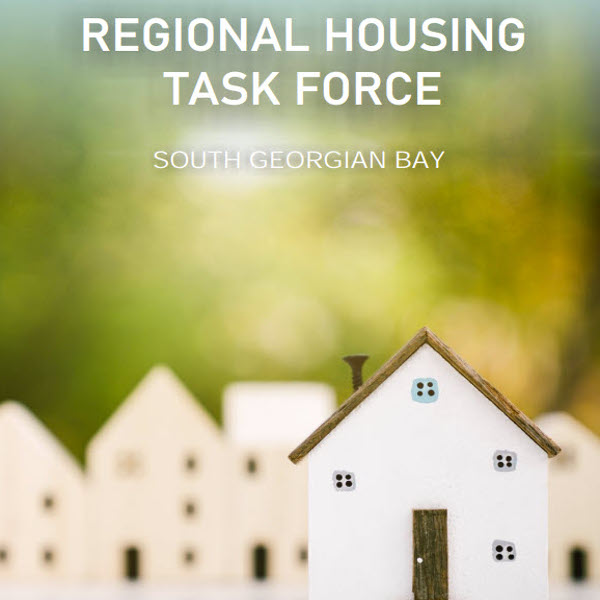A group of interested citizens has spent almost a year studying the issue of affordable housing in South Georgian Bay and are now sharing what they’ve learned.
The regional task force, which included politicians, agency representatives, and housing advocates, first collected data and then interviewed representatives from planning, development, construction, and the County to learn more about possibilities, innovation, and potential solutions. One of the things they learned is that the issue is highly complex with no easy fixes.
“We need to start by understanding the problem,” said Chairperson Marg Scheben-Edey. She said they discovered that few communities in the region have collected appropriate data and have not set targets to meet the needs in our local communities.
For example, they learned that renters, on average, earn half of what homeowners do and this is significant when targeting rental rates. According to the 2016 census, the median household income in South Georgian Bay was $62,671, however, when broken down, homeowner households earned over $76,000 while renter households earned less than $40,000. They also learned that over 5,500 households in the region were in core housing need, meaning that they were spending more than the accepted 30% of gross household income on shelter, or were in inadequate or unsuitable housing.
Another significant finding is that the area is losing affordable housing units far faster than it is able to create them. While studies have shown that in Canada 15 units are lost for every one created, Scheben-Edey says the ratio is far higher here. Gentrification, vacancy decontrol, demolitions, and the strong real estate market have led to the loss of multiple units in apartment buildings, rooming houses, and single-family homes, with almost no new affordable units created to replace them.
The task force engaged over 400 people in a public survey on the topic and the responses were concerning. Sixty-three percent of respondents said they would move out of the area if affordable housing were unavailable. A number of respondents suggested suicide would be an option. Of those receiving government assistance, those who collected CPP and/or OAS topped the list.
Other key findings in the report include:
- Intensification and adding supply do not in themselves create affordable housing unless there are policies tied to affordability and increased supply.
- The most urgent need is for rental housing.
- Affordable housing is not social housing, which generally confuses the public. Complete communities have housing for all, which is based on households not spending more than 30% of gross household income on shelter costs regardless of their income level.
- Municipalities are important stakeholders. Counties deal with supportive housing but municipalities have tools that could and should be used to facilitate the creation of housing that is affordable to its residents.
- Housing for all is a critical component of a sustainable community future. If we can’t house people there are consequences, such as the loss of our labour force and businesses, increased physical and mental health impacts, and increased food insecurity.
“Affordable Housing is very much an economic development issue as well as one of equity and inclusion,” said Scheben-Edey. “Safe, secure, and affordable housing for all is a human right yet we are failing to provide it.”
The report states that all stakeholders, from all levels of government to not-for-profit agencies and the private sector have a role to play. As a start, the report includes a toolkit that municipalities can use to help tackle the problem.
The task force is presenting its findings to local municipalities over the next month, with the recommendations that those who have not already done so should establish an affordable housing committee in their town to collect and analyze data, set targets, develop housing master plans, and make appropriate recommendations to their local council on positive actions that can be taken. They also hope that a regional committee can be set up to share learnings and resources.
A full copy of the report can be found on The Institute of Southern Georgian Bay website at https://tisgb.com/newsletter/the-regional-housing-task-forces-latest-report-on-affordable-housing/












